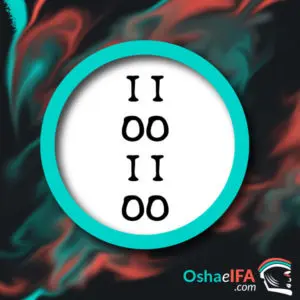Oshe Bile (Oshe Irete)

Oshe Bile, Odu number 236 in the Lordly Order of Ifá, addresses the duality of family inheritance, pointing out how both blessings and adversities are inherited. This reveals the transmission of material goods along with physical or spiritual illnesses, outlining the deep connection between the past and the present.
Additionally, Oshe Bile examines the transmission of behavioral patterns, highlighting how virtues and vices weave through family lines, influencing personal and collective dynamics. She invites us to reflect on family legacy and the importance of recognizing and transforming inherited patterns for the well-being of future generations.
General description of the Odu of Ifa Oshe Bile (Irete):
Oshe Bile reveals the sacred use of the coconut as an oracle and channel for communication with the gods, emphasizing the relevance of Elegua and Shango in our lives. This Odu illuminates how these divinities play crucial roles in spiritual guidance and protection, highlighting their power and influence on human destiny.
Names and nicknames:
- Oshe Bile.
- Oshe Irete.
What is born in the odu of Ifá Oshe Bile?
- Get your eyes wet when you see this Ifá; If he is seen, the Awó sprays Elegbá, chews ataré and gives him an akukó.
- Pour water into the ebó and kasheorun.
- Smallpox
- The Elegua de Maza.
- Respect for the word of the rooster.
- Do not throw the obi over Etawé with Elegbá, Oggún, Oshósi, Orunmilá, Oduduwa, Olófin, Osún, Shangó.
- That the Awó Oshe Bile is the only one who has to throw the obi over Etawé.
- How to fortune tell with coconut (obi).
- The Oracle of Biawé.
- Say "Forgive me, my Father."
- That the obi serves to represent Elegbá.
- Set Elegbá on stone, because the coconut rots.
- The pact between obi and Oshe Bile.
What does the Oshe Bile sign talk about?
- That the wood pigeon always brings out.
- The phrase "God willing."
- That Olofin, Oduduwa and Orunmilá came down to Earth to see how things were going.
- Baba Doma, King in the Land of Intelligence.
- That Oshe gave birth to Irete.
- Oshe Bile's tight soap.
- Ask the thunder for powers.
- The wheelchair.
- Dies from drowning or suffocation, lung problems.
- Talk about kidney infection and penis reconstruction.
- It is the Ifá of the tiger and the cat (of usurpation).
- Oggún touches the person (operation).
- Do not split obi in 7 days, do not eat anything with obi.
- The obi offended Orunmilá.
The Oshe Bile Sign points out that:
- It is an Ifá of Awó Ilé.
- Olofin disguised himself as a beggar to check on Oshe Bile and cursed him for his behavior.
- The light is given thanks.
- Obi is given on Sundays to the Guardian Angel, the Awó of this sign.
- The secret is passed day by day to the Awó Oshe Bile.
- The vain obi was cursed by Olofin.
- The eyes, nose and head of the obi speak.
- The obi dismissed Elegbá from his house.
- The influence of Olofin acts greatly.
- The Eweses are: Bishop's Salad (Yedra) and Bramble (Cat's Claw).
It may interest you: Sign of Ifa Oshe Meyi
Analysis and Reflection of the Ifa sign Oshe Bile
Oshe Bile is a call for caution and deep analysis before acting. She represents the mind that does not stop to reflect, leading her children to face failures and unnecessary obstacles. The invitation is to meditation and spiritual guidance to overcome barriers. This Odu also talks about the importance of looking good to people, since deception or dishonesty can have a negative impact, multiplying spiritual debts.
Economic Aspects:
On the economic level, Oshe Bile emphasizes collaboration and partnership as means to achieve power and influence. He notes that success and fortune can come from respect, influence and money, but warns that going it alone may be insufficient. This Odu suggests that there is strength in numbers, especially in ventures that seek economic growth and development.
Health:
In terms of health, Oshe Bile warns about specific problems such as kidney infection, breathing difficulties and the need to pay special attention to diet, avoiding hard foods. In addition, the Odu advises particular care to avoid abdominal cramps in women and problems related to the kidney and respiratory system.
Religious Aspects:
Religiously, this sign emphasizes the importance of fulfilling sacrifices and offerings to family Orishas and Eguns, thus ensuring protection and spiritual support. Oshe Irete highlights the power and authority of Shango (Olufala) as his main deity and the need to act with honesty and respect towards elders, both family and religious, to ensure the transmission of power and knowledge.
Personal Relationships (Love):
In the field of love, Oshe Bile warns about wars between women and the importance of doing Ebó to overcome conflicts in personal relationships. This Odu invites you to avoid betrayals and erratic behavior that can damage intimate and family relationships. Fidelity and mutual respect are presented as pillars to build lasting and meaningful relationships.
Oshe Bile, in his essence, is an Odu of deep introspection and growth. He teaches us the importance of reflection before action, the value of honest relationships and the power of unity in the pursuit of common goals. By adhering to the spiritual and ethical practices it promotes, we can navigate the currents of life with greater wisdom and achieve holistic well-being. This Odu reminds us that, in the search for self-realization, respect for the sacred and humility before the universe are our greatest allies.
If you are interested in Yoruba practices and the veneration of the Orishas, our article on Shango will provide you with a complete insight into its origins, symbolism, and how to work with its energy on your spiritual path.
Recommendations and advice of the Oshe Bile sign:
- Spray Elegbá with Ataré and Offer a Rooster: To start any new project or journey, it is advisable to perform rituals of purification and offering to Elegbá, symbolizing the opening of paths and protection against obstacles.
- Cultivate Patience and Faith: “God willing” is a reminder of the importance of having faith in a higher power and accepting that everything happens according to a divinely ordained time, beyond our immediate understanding and control.
- Respect for Nature and its Cycles: Observance of natural cycles and respect for natural entities and elements, such as water and plants (Ivy and Cat's Claw), are crucial to maintaining balance and harmony.
- Valuing the Power of Forgiveness and Gratitude: “Forgive me, my Father” and gratitude towards the light are expressions that emphasize the importance of humility, forgiveness and recognition of the blessings in our lives.
- Guide and Educate with Care: Wise guidance and counsel are imperative for those under this Odu, to avoid failures and guide them to success.
- Partner for Success: Reflecting the teaching that "you must associate with someone to gain power, they are just nobody," the importance of collaborations and strategic alliances is underlined. This recommendation suggests that unity and teamwork are essential to achieve success and power, remembering that interdependence is a powerful force.
Prohibitions:
- Avoid Deception and Betrayal: It is crucial to stay away from deceitful behavior and betrayal, especially towards spiritual authority figures and family members, as this can attract curses and misfortunes.
- Restriction on the Use of Coconut: Coconut should not be used in rituals irresponsibly or during prohibited periods, respecting its power and sacred meaning.
- Abstain from Raw Foods and Coconut: Abstaining from consuming certain foods during specific periods is essential to avoid negative energies and maintain spiritual purity.
- Do Not Neglect Spiritual Obligations: Negligence in offerings, sacrifices and care for the Orishas and ancestors can result in the loss of protection and blessings.
- Avoid False Testimony: Honesty is essential in all interactions; False testimony can lead to adverse spiritual consequences.
These recommendations and prohibitions are derived from the teachings and symbolism intrinsic to Odu Oshe Bile, offering spiritual guidance for those seeking to align their lives with Yoruba principles. By adhering to these guidelines, practitioners can foster a more harmonious, balanced, and cosmos-connected existence.
Oshe Bile saying:
- When you choose the path well, you reach the goal well.
- The coconut rolls and rolls until it bursts.
"When you choose the path well, you reach the goal well" is a saying that highlights the importance of wisdom and foresight in our decisions. This proverb teaches us that consciously and deliberately choosing our paths in life has a direct impact on achieving our goals and dreams. It encourages us to reflect deeply before making decisions, understanding that each choice brings us closer or further away from our desired goals. Prudence, therefore, is not only a virtue, but an essential tool for navigating the labyrinth of life, ensuring that every step we take is aligned with our highest purpose and destiny.
"The coconut rolls and rolls until it bursts" warns us about the inevitable consequences of persistence without reflection and action without direction. Through the metaphor of the coconut rolling aimlessly until its eventual destruction, this saying reminds us that action alone, without purpose or consideration, can lead to destructive or unwanted results. It underscores the importance of aligning our actions with our values, goals, and the greater good, and urges us to take reflective pauses in our journey, evaluating whether our current actions are leading us toward fulfilling our true mission in life.
Ifa ethical code of odu Oshe Bile:
- The Awo does not deceive the aleyo so that the guardian angel of that aleyo does not charge him for his fault or deception.
Meaning of the Sign Oshe Bile (Oshe Irete):
The Awó must be cautious and act with integrity when interpreting this Odu, to avoid disagreements with the Guardian Angel of the consulted. This sign warns about the tendency to deceive within Oshe Bile, underscoring the importance of honesty in spiritual practice.
It is characterized by quick-thinking but superficial people, often acting without prior consideration, leading to multiple failures. It is crucial to provide guidance to overcome obstacles.
It is essential to offer sacrifices to the Orishas, at the doorstep (Shilekún), and to the ancestors (Egun Araé). Placing a bottle of sea water with flowers behind the Shilekun symbolizes purification and respect for the spiritual.
It is recommended to avoid lying and inappropriate humor, as they can erode trust, even when the truth is told. Moderation in alcohol consumption is also crucial to maintaining clarity and respect for yourself and others.
Oshe Bile in Ire (Wellbeing): This Odu suggests a strong potential to travel and explore new horizons. He highlights the confrontation between intelligence, power and strength, and notes that success and good fortune, both in terms of financial and social influence, are attainable. However, he warns of corruption and moral decay, symbolized by the rotten coconut.
Oshe Bile (Irete) in Osogbo (Adversity): Warns about the risk of betraying close allies out of selfishness or the pursuit of ephemeral pleasures, which can lead to loss of support and betrayal. This sign also mentions fertility problems or "belly binding" in women, emphasizing the importance of seeking spiritual solutions. The fruitless pursuit of goals can be a recurring theme, necessitating a refocusing of aspirations and efforts.
Olodumare's distribution of power and blessings in Oshe Bile underscores the possibility of spiritual and material growth when following the right path and respecting the divine word.
It may interest you: Treaty of the Odu Oshe Bara
Prayer of the Odu Oshe Bile:
Ayaun Royun Bemi Loma Tinshomo Okuni Orodan Oshe Bile Adawe Biawe Babadona, Orun Adiatoto Adafun Alakenta, Oshe Bile Adawe Biawe Babadona, Orun Adiatoto Adafun Alakisisi, Oshe Bile Adawe Biawe Babadona, Orun Adiatoto Adafun Alakentu Alakenta Oomali Obi Obi Ataremo Atakemo Komalie Obi Dakentamo Alakisisi, Obi Atare Komalie Alakentu Dada Omo Obi Libo Ala Ibo Obi Ifa Awo.
Oshe bile's prayer to give coconut:
OSHE BILE ODU IRE OBI AWO
ADIATOTO ADIFAFUN ALAKETA
OSHE VILE ODU IRE OBI AWO
ADIATOTO ADIFAFUN ALADESISI
OSHE BILE ODU IRE OBI AWO
ADIATOTO ADIFAFUN ALAKETU
OBI ATANU KO MA JE ALADETA
OBI ATANU KO MA JE ALADESISI
OBI ATANU DO MA JE ALAKESISI
OWO MY WING EBE OBI IFA OWO
ILE MO OKU O, A PE YE.
Prayer from Oshe Bile to Eggun:
To give coconut to Eggun, pray the following:
OBI YEKU YEKU IKU EGUN
AWA NILORON
LOWO FIBI IKU
AWA NI LORUN
MAYEBU OBI
MAFUN EGUN OBI TIWA
OBA TI OBA KU OLORUN
MOWA YODE EGUN OBI
THE FIBI IKU
OKANA YUREO
OBATI BIKU LOWO LESE
IRE ARA UN
BAINLE IRE OBI IFA
OBI FUN EGUN
OBI FUN INLE
OBI FUN OLORUN
OBI FUN EGGUN ODARA
Says Ifa odu Oshe Bile
Be cautious of possible betrayal or false testimony. Someone could try to harm you, although that attempt to harm will turn into benefit for you. If you are in a relationship, be alert to potential conflicts, especially if there is a third person intent on interfering. For pregnant women, there is a risk of facing envy or bad intentions. It is essential to seek spiritual protection and approach the deities, especially if Oshun shows her displeasure over some past action.
You could face attempts to usurp property or assets, but these will not be successful. The economic situation can be challenging, with enemies awaiting your failure. Do not underestimate the importance of generosity, even in the face of requests for alms. Conflicts, potentially violent, must be handled with caution, invoking Ogun for resolution. Thank Oba and Shango for their protection and keep an eye on inherited possessions to avoid theft or unjustified claims.
When facing challenges with children, especially non-biological ones, it may be necessary to turn to the courts to resolve disputes. Perseverance is key; Although the desired results take time to manifest, use your ingenuity to overcome obstacles. Be careful on trips, particularly to the countryside, to avoid falling into traps. Respect and value what you have, getting rid of the unnecessary in your home and life.
Ebboses (Works) by Oshe Bile:
Paraldo by Oshe Irete:
For this ebbo you require: a chicken, a dove, yam, brandy, palm oil, red cloth and two candles. The yam is cooked and mixed with palm oil to form a circle on the ground. An offering is also placed to Shango, explaining to him with two candles and a fresh fish is added. Within the circle the signs of Otura Nuko and Oshe Bile are inscribed. The initiate stands behind the circle, cleans himself with the fish, which is then placed inside the circle. The paraldo is performed with the chicken. The blood is offered to the fish and the circle, and a bath is carried out with the red cloth. Finally, the dove is used to cleanse the initiate, washing his head with soap and omiero. Everything is hung or buried as part of the closing of the ritual.
Work by Oshe Irete with Elegua:
When this Ifá appears for an Awó, he must chew 11 grains of guinea pepper with brandy and sprinkle Elegua. He places pringamosa (ortiguilla) on and in front of Elegua, followed by the sacrifice of a rooster to invoke prosperity. Then, he offers himself a mixture of honey and crushed ekó.
It is important to mention that, although pringamosa generally refers to the nettle, there is another plant with this name, characterized by its wide leaves and thorns on stems and leaves, common in the eastern hills.
It may interest you: Odu of Ifa Irete Unfa
Patakies (stories) of the Oshe Bile sign:
The Oracle of Obi (Coco):
There was an Awó named Biawe who had a son, Adiatoto, to whom he had taught his most valuable secret: the technique of turning coconuts. In Biawe's house there lived several boys who considered themselves brothers, Adiatoto being the youngest of all.
When Biawe died, boys who were not his biological children stole the documents containing the secret. In this way, Adiatoto found himself in difficulties until, with the Government needing to clarify the truth, he began a search for the legitimate owners. Many suitors arose, but none could present the evidence that the documents demanded. Faced with this situation, the Government decided to make a public call.
Adiatoto, upon learning of the search, appeared before the authorities and offered them proof. He said that his test would consist of throwing coconuts from the walls that divided the rooms; If the coconuts fell face up, he would prove that he was the true heir to the secret, just as his father had taught him. When performing the test, all the coconuts fell face up, a sign of Alafia. Convinced, the Government restored the land that had been usurped.
Moral: Adiatoto's story teaches us the importance of authenticity and truth. Despite obstacles and unfair competition, integrity and true knowledge prevail. This story reminds us that, in times of trial, our actions and our faith in authentic teachings will be the key to reclaiming our right and restoring justice.
Obi the vain:
OLOFIN believed in Obi's righteousness, without a trace of pride or vanity, and elevated him to a position of high esteem so that he would be recognized and valued by all. He granted her a pure soul, reflecting his purity of intentions and powers. Elegua, the faithful messenger of Olofin, was assigned to serve Obi, allowing him to meet all of Obi's friends, who were people of good reputation. However, Elegua perceived that Obi was unaware of the existence of people different from his circle, who also needed attention and help.
During a party organized by Obi, Elegbá invited disadvantaged and marginalized people, which caused Obi's discontent when he saw his home full of people who did not meet his standards of cleanliness and decorum. This caused Obi to fire Elegbá.
When Olofin found out what happened through Elegbá, he decided to verify the veracity of the facts. Disguised as a beggar, Olofin was rejected by Obi due to his disheveled appearance. Revealing his true identity, Obi knelt asking for forgiveness. Olofin, disappointed by Obi's vanity, cursed him so that, as long as the world existed, he would be white on the inside but black on the outside, condemned to roll on the ground and always serve under the direction of Elegbá, telling the truth and unable to refuse. to nothing.
Explanation: This story underscores the importance of humility and non-judgmental service. Olofin punished Obi's vanity by transforming him into an entity that, although pure internally, would carry a mark of external humility. He teaches us that a person's true value lies not in his outward appearance or in the company he keeps, but in his ability to serve and help all without distinction. The central message is that we must treat everyone with respect and compassion, regardless of their social or physical status, and remember that everyone deserves dignity and love.
Oshe Bile Ifa Traditional:
ÒI KNOW ÌRETÈ
I know tea
irete tea
Babaláwo Eku ló día fun Eku
I know tea
irete tea
Babaláwo Eja ló día fun Eja
I know tea
irete tea
Babaláwo Eye ló día fun Eye
I know tea
irete tea
Babaláwo Eran ló díá fun Eran
I know tea
irete tea
Babaláwo Àmùre or dàgbà díía fún Àmùrè ò dàgbà
Èyí tíí we are ìkéyìin won lénje lénje
Wón ní kí wón ó rbo
Wón ní kí Eku ó rubo
Ekú ni kin ni n je bee?
Òún n bá gbajúmò òun lo nùu
Wón ní kí Eja or rubo
Ejá ni kín ni n jébo?
Wón ní kí àwon Eye ojú òrun ó rubo
Wón ni kín ni n jé béè?
Ìwo Were nko?
O ò wa rubo
They were mon
Kín lòun or febo se?
Àmùrè or dàgbà
Bóo ni ti?
Àmùrè ò dàgbà lórí òun ò gbó
Ó bá rbo
Ó fun Ikin lobi
Wón ní kó móo se bíi tòkè ìpòrí è
Ngbà tíkú dé
O mú Eku
Wón ní kí won or móo dárí è jiyàn
O mú Eja
Won ni kí won or móo dá orí Eja jiyán
O mú Eye
ó peye
Wón ni wón or dárí è jiyàn
Ó meran
or peran
Wón dárí è jiyán
Ikú bá dé òdò Àmùrè ò dàgbà
Ikú or read for Amùrè or dàgbà
Won lóun níí sébì funn Eríwo
Àmùrè ò dàgbà bá n jó
Ní bá n yo
Ní n yin àwon Babaláwo
Àwon Babaláwo n yin Ifá
Ó ní béè làwon Babaláwo tòún wí
I know tea
irete tea
To day fun Eku
Eja fun day
To day fun Eye
A day fún were
To day fún Àmùrè ò dàgbà tíí we are ìkéyìin won lénje lenje
biire biire
Iku knob Eku tí ò mebo
biire biire
Ikú knob Eja tí ò mebo
biire biire
Ikú knob Eye tí ò mebo
biire biire
Ikú pomo They were you or mebo
Ikú móo Àmùrè sésé or
Ikú knob Eku ti ò mebo
kó móo sébì
Kó móo sébì fÉríwo
Awo laugh
LÀmùrè sésé or
Awo laugh
Ìpàdì Awo won ò kú bòrò bòrò.
Ifá advises this person to make a sacrifice.
I know tea
irete tea
They are the Rat priests, the ones who made divination for the Rat
I know tea
irete tea
They are the priests of the Fish, the ones who made divination for the Fish
I know tea
irete tea
It is the priests of the Bird who made divination for the Bird
I know tea
irete tea
They are the priests of the Animals, those who made divination for the Animals
I know tea
irete tea
They are the priests of Àmùrè or dàgbà, who were the ones who made divination for Àmùrè or dàgbà
The last born child of the family
They all were advised to offer sacrifice
The Rat was advised to make the sacrifice
The Rat said 'What do you call sacrifice?'
'I'm going to enjoy'
The Fish was also advised to offer sacrifice
The Fish said; 'What do you call sacrifice?'
The bird was advised to offer sacrifice
The bird also said 'What do you mean?'
What happened to the Animal?
Why don't you make the sacrifice?
The Animal said: 'I!'
'For what purpose?'
Àmùrè or Dàgbà 'What about you?'
They told Àmùrè dàgbà that he could not dare to suffer the consequences
And made the sacrifice
He gave kola to Ikin
They even advised him to behave according to Ifá tells him
When death drew near
Arrested the Rat
They used the rat's head to eat them with chopped yam
Arrested the Fish
And they told the man to use the head of the Fish to eat it with chopped yam
He arrested the bird
And killed the bird
And they used the dead bird to eat it or accompany it with chopped yam
They also arrested all the Animals
They killed them
And they used their heads to eat them with chopped yams
When it was the turn of Àmùrè or dàgbà to die
Death could not take him away
They said to death that he was the only one who broke Kola Nut for Eríwo
Àmùrè or dàgbà started dancing then
He was praising his Babalawos
And his Babaláwos began to praise Ifá
They said it was exactly as their Babaláwos had said
I know tea
irete tea
They are the Rat priests, the ones who made divination for the Rat
The fish
The bird
The animal
And also for Àmùrè or dàgbà the lesser of the four
As if it were a game
Death killed the son of the Rat who offered no sacrifice
As if it were a game
Death killed the son of the Fish who offered no sacrifice
As if it were a game
Death killed the son of the Bird who offered no sacrifice
As if it were a game
Death killed the son of the Animal who offered no sacrifice
Death could not kill Àmùrè sésé
He was saved to continue dividing the Kola Nut
He must continue to divide the Kola for the Eríwos
Good priest and wise
It is the Babaláwo known as Àmùrè sésé
Good and wise priest
Ìpàdì Awo won ò kú borò bòrò.















Hmmm, this ifa oshe bile is pointing at me, I went to consult from the IFA and I was told the odu that comes out is oshe bile, so I was told to do some sacrifice but still finding the money….I pray everything turn good to me Ase edumare,,,But please I need to know the rules of what this odu must not do
Aboru Aboye Abosise
First question?
Aere you Babaláwo?
Odu ni Ifa and when you doing your ceremony, I need that information before saying something..
I believe do you understand my point..
Have and excellent day
Ìbùkún Eledumare
Abures iboru iboya ibosheshe, I am Venezuelan and have been living in Lima, Peru for 5 years. I came from Venezuela for obvious reasons. I have type 2 diabetes. In November of last year, an artery in the 5th toe of my left foot was infarcted and due to poor practice from the doctor. They amputated my finger, I need financial help since I live rented and for now I cannot work until I recover. +51 945204537 I ask for your help.
Olofin bless you all